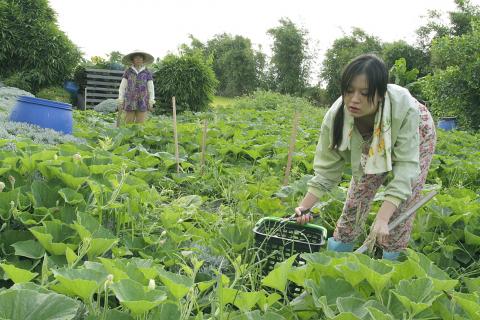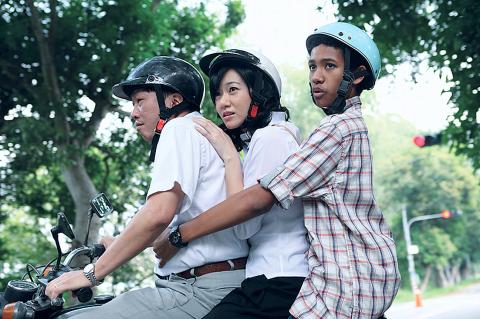A ccording to statistics compiled by the Ministry of the Interior (內政部), the number of married immigrants in Taiwan exceeded 450,000 last year. Yet despite their increasing presence, these foreign spouses, most of whom come from China, Vietnam and Indonesia, remain largely invisible in mainstream Taiwanese society and the mass media.
Four films currently showing at the SPOT — Taipei Film House (光點台北), under the appellation of We Are Family: Festival of the New Immigrants (內人/外人新移民系列電影), shed light on these newcomers.
The idea to make films about immigrants first came to film producer Khan Lee (李崗) five years ago. With funding and support from the National Immigration Agency (移民署) and Videoland Inc (緯來電視網), the project evolved into four feature-length movies by four Taiwanese directors.

Photo courtesy of Zeus International Production
In My Little Honey Moon (野蓮香), director Cheng Yu-chieh (鄭有傑) explores his interest in the themes of migration and diaspora, which he first addressed in his debut feature Do Over (一年之初, 2006). The film tells the tale of a family drama centering on Joan, played by Vietnamese actress Helen Thanh Dao, a woman who made her home in the Hakka town of Meinong (美濃) in Greater Kaohsiung.
Joan has dedicated herself to her husband’s family for the six years since she moved to Taiwan. She masters Hakka and Mandarin, yet her husband can’t speak a word of Vietnamese, and her mother-in-law, with her occasional racist comments, has never made Joan feel part of the family. The Vietnamese wife and mother soon develops a friendship with her reticent daughter’s teacher Sun, played by songstress and actor Yangui Yasiungu of Tsou tribe (鄒族), who, as a person of Aboriginal descent, understands too well what it feels like to be an outsider.
Sticking to straight-forward storytelling, the film is less striking than the director’s previous works, but its approach to its characters, especially the husband, played by theater actor Chen Zhu-sheng (陳竹昇), whose ego is wounded and pride suffers because he can barely support his family with his organic farming business, is sincere.

Photo courtesy of Zeus International Production
In The Golden Child (金孫), seasoned female director Chou She-wei (周旭薇) adopts a blackly comic and slightly absurd tone in portraying Vietnamese woman Jinzhi’s (Esther Liu, 劉品言) struggle to fulfill the traditional role of female in a Hoklo village in Taichung. One of the many eloquent moments in the film that challenge conventional ideas of family involves Jinzhi’s sister’s half-black and half-Vietnamese baby boy, who Jinzhi eventually raises as her own, frolicking in front of the portraits of the husband’s ancestors.
Technically polished and emotionally absorbing, The Happy Life of Debbie (黛比的幸福生活) tells the bitter-sweet tale of Debbie (Jade Chou, 周幼婷) from Indonesia, who works as a coffee bean picker in Gukeng Township (古坑), Yunlin County, to support her unemployed husband Lu (Chao Cheng-ping, 趙正平) and her teenage son Han, played by first-time actor Nur Najman Ade Putra. Their life is interrupted when a suited Indonesian man shows up at the door, threatening to lay bare the family’s long-held secret.
In the film, her second feature, director Fu Tien-yu (傅天余) demonstrates she possesses surprisingly mature storytelling skills. The movie opens with a nearly 10-minute scene that neatly shows Fu’s talents: Debbie wakes up from dream about her lush hometown. It takes her a second to realize she is now in a place far away from home. On her way to deliver coffee beans, she receives two phone calls. In the first, she is told that her drunken husband is in trouble again at work; in the other she is asked to pick up her son, who has been bullied at school. Debbie stops at a crossroads, not knowing which way to go.

Photo courtesy of Zeus International Production
Meanwhile, award-winning television director Chen Hui-ling’s (陳慧翎) The Moonlight in Jilin (吉林的月光) tells a rather uneven tale about the plight of Chinese woman Weiwei (Yin Shin, 尹馨), who comes all the way to subtropical Taiwan from her snow-capped hometown of Jilin only to find the man she has married is a criminal on the run.
The series runs until May 25 at SPOT — Taipei Film House (光點台北), 18, Zhongshan N Rd Sec 2, Taipei City (台北市中山北路二段18號). All films have English subtitles. A screening schedule can be found at www.spot.org.tw.

Photo courtesy of Zeus International Production

Since their leader Ko Wen-je (柯文哲) and others were jailed as part of several ongoing bribery investigations, the Taiwan People’s Party (TPP) has risen in the polls. Additionally, despite all the many and varied allegations against Ko and most of the top people in the party, it has held together with only a tiny number of minor figures exiting. The TPP has taken some damage, but vastly less than the New Power Party (NPP) did after it was caught up in a bribery scandal in 2020. The TPP has for years registered favorability in the thirties, and a Formosa poll

Chiayi County is blessed with several worthwhile upland trails, not all of which I’ve hiked. A few weeks ago, I finally got around to tackling Tanghu Historic Trail (塘湖古道), a short but unusually steep route in Jhuci Township (竹崎). According to the Web site of the Alishan National Scenic Area (阿里山國家風景區), the path climbs from 308m above sea level to an elevation of 770m in just 1.58km, an average gradient of 29 percent. And unless you arrange for someone to bring you to the starting point and collect you at the other end, there’s no way to avoid a significant amount

While global attention is finally being focused on the People’s Republic of China (PRC) gray zone aggression against Philippine territory in the South China Sea, at the other end of the PRC’s infamous 9 dash line map, PRC vessels are conducting an identical campaign against Indonesia, most importantly in the Natuna Islands. The Natunas fall into a gray area: do the dashes at the end of the PRC “cow’s tongue” map include the islands? It’s not clear. Less well known is that they also fall into another gray area. Indonesia’s Exclusive Economic Zone (EEZ) claim and continental shelf claim are not

Nov. 4 to Nov. 10 Apollo magazine (文星) vowed that it wouldn’t play by the rules in its first issue — a bold statement to make in 1957, when anyone could be jailed for saying the wrong thing. However, the introduction to the inaugural Nov. 5 issue also defined the magazine as a “lifestyle, literature and art” publication, and the contents were relatively tame for the first four years, writes Tao Heng-sheng (陶恒生) in “The Apollo magazine that wouldn’t play by the rules” (不按牌理出牌的文星雜誌). In 1961, the magazine changed its mission to “thought, lifestyle and art” and adopted a more critical tone with